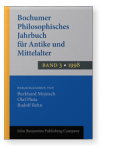Allgegenwart und Unendlichkeit Gottes in der lateinischen Patristik sowie im philosophischen und theologischen Denken des frühen Mittelalters
Abstract
This essay intends to contribute to the history of the ideas of omnipresence and infinity as two related attributes of God in the theology of the Latin Church Fathers and in the philosophical and theological thinking of the early Middle Ages. The classical Christian doctrine of the infinite presence of God was developed within the early Latin context by Hilarius of Poitiers and foremost by Augustine, who set forth the unique omnipresence of God through the formula that God is «wholly everywhere in himself» (in se ipso ubique totus). Gregory the Great expanded upon this formula and passed it on to the early Middle Ages. Boethius comprehended the omnipresence of God primarily as his omniscience and defined his timeless presence - his eternity - as the simultaneously entire and perfect possession of unlimited life. While Eriugena's comprehension of the omnipresence of God is mostly rooted in Maximus Confessor's doctrine of God's omnipresence, his teaching of the essential infinity of God is quite original. The clearly most important contribution to the history of the omnipresence and infinity of God in the early Middle Ages was made by Anselm of Canterbury in chapters 20-24 of his Monologion, in chapters 13,18 and 19 of his Proslogion and in his famous reply to Gaunilo.
Cited by (1)
Cited by one other publication
Enders, Markus
2000.
Das romantische Unendlichkeitsverständnis Friedrich Schlegels.
Deutsche Vierteljahrsschrift für Literaturwissenschaft und Geistesgeschichte 74:1
► pp. 44 ff.

This list is based on CrossRef data as of 1 august 2024. Please note that it may not be complete. Sources presented here have been supplied by the respective publishers.
Any errors therein should be reported to them.
